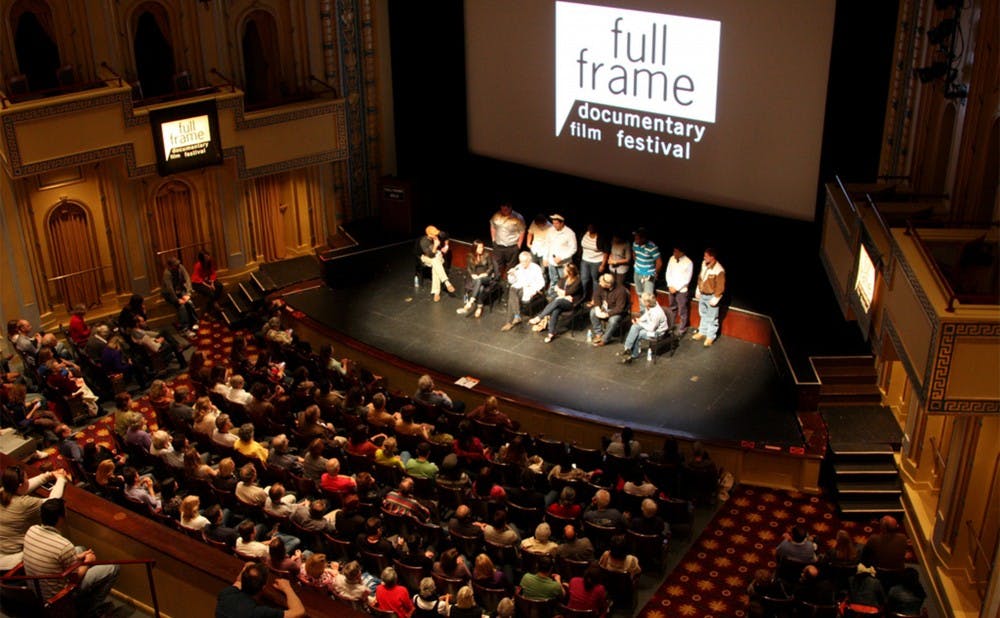More than 90 different films, new and old, were meticulously selected for the 17th annual Full Frame Documentary Film Festival. The downtown Durham-based festival, a program of Duke’s Center for Documentary Studies, begins this Thursday, April 3, and ends Sunday, April 6.
The opening night film, held in the grand Fletcher Hall at the Carolina Theatre, is the world premiere of “112 Weddings” by Doug Block (“51 Birch Street,” “The Kids Grow Up”). Block, who is known for his extremely personal and autobiographical documentaries, began filming weddings on the side, and “112 Weddings” is the meeting point of his work. Combining idyllic wedding footage with recent interviews, Block speaks with nine couples who candidly and poignantly discuss their marriages, describing how things have changed, how things have ended or how things have worked.
The new documentaries vary enormously in scope, ranging from Frank Zappa’s 1982 concert in Palermo, Sicily to a Scottish family trying to raise American bison to a Barack Obama lookalike. In “Ana Ana” (Arabic for “I am me”), four women living in Cairo record their lives as artists, dancers and writers, connecting personal narratives to women’s footage to post-revolutionary Egypt. “The Hip-Hop Fellow” features Grammy Award-winning producer and Duke professor, 9th Wonder, as he develops his own artistry, incorporates hip-hop music studies into academia and preserves an entire culture. In the tragic and touching “Where is My Son?” JunKyo Lee returns home to his mother, Giseon Kwon, to care for her as her memories fade, and the two provide an intimate depiction of life, family and a child’s love.
Highlights from other film festivals include Sundance Directing Award winners Ben Cotner and Duke alum Ryan White’s “The Case Against 8,” a behind-the-scenes look into the trial that overturned the constitutional amendment to repeal the right of same-sex couples to marry. Specially trained members of Human Rights Watch fearlessly investigate war crimes in Syria and Libya in “E-Team,” and in “Alive Inside,” a social worker discovers the transformative power of playing music for elderly people with dementia. “Freedom Summer” takes its audiences back to Mississippi in 1964, when 1000 students were sent to help register voters and catalyze political participation. “Soft Vengeance” focuses on Albie Sachs, a lawyer and member of the African National Conference, and his journey to abolish apartheid and rebuild South Africa. Finally, “Visitors” is a black-and-white and wordless feature, capturing faces and landscapes in a visceral portrait of modern life.
This year is Full Frame’s tribute to director Steve James who, in 2009, helped compose a sports documentary lineup for the 2009 festival and will this year join some of his subjects for Q&As after the screenings of his films. The six screenings will include such seminal and award-winning films as the difficult “Stevie” (2000). After 10 years, the filmmaker returns to rural Illinois to reconnect with the troubled Stevie Fielding, for whom he had been a Big Brother. James finds that Stevie had been charged with molesting his eight-year-old cousin. As we watch him attempt to help Stevie, James and his interactions become an important part of the film as he struggles to define the role he plays as a Big Brother and as a documentarian. In “Hoop Dreams” (1994), a moving, five-year exploration of race, class and privilege, James chronicles Arthur Agee, Jr. and William Gates. The two black, inner-city Chicago teenagers are recruited for a mostly white suburban prep school’s basketball team, and we watch as they are forced to overcome obstacles to live out their dreams. Along with this film is Hoop Dreams at 20, a panel discussion celebrating the 20th anniversary of the documentary with Steve James, producer/cinematographer Peter Gilbert and subjects Arthur Agee, Jr. and Sheila Agee.
Two-time Academy Award-nominated filmmaker Lucy Walker (“David Hockney IN THE NOW (in six minutes),” “Waste Land”) curated this year’s 12-film Thematic Program “Approaches to Character.” Walker has selected a series of films that showcases several filmmakers employing a variety of techniques to intimately portray their subjects. These follow Fini Straubinger in Werner Herzog’s “Land of Silence and Darkness” (1971), who after years of being confined by deafness and blindness, decides to find ways to communicate with others like herself. Then there is Lars von Trier and Jørgen Leth’s “The Five Obstructions” (2003), in which von Trier challenges Leth to remake Leth’s 12-minute film, “The Perfect Human,” five times, each with a new obstruction.
For more information on lineup and tickets, visit the Full Frame website.
Get The Chronicle straight to your inbox
Sign up for our weekly newsletter. Cancel at any time.

